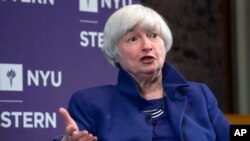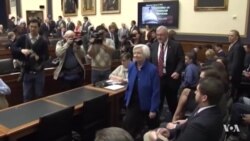Federal Reserve Chair Janet Yellen will update Congress on her economic outlook Wednesday and possibly weigh in on the mystery of why inflation has remained persistently below the Fed's target rate.
Yellen's testimony to the Joint Economic Committee could mark her final appearance before Congress before her four-year term as Fed chair ends in February. Her successor will be Jerome Powell, a Fed board member who himself addressed a Senate panel Tuesday at his confirmation hearing - if, as expected, Powell is confirmed by the Senate.
During his hearing, Powell said he intended to continue Yellen's policy of gradual increases in interest rates, given that the economy is on firm footing and the unemployment rate is just 4.1 percent, its lowest point in nearly 17 years. Powell said he thinks that even with the Fed gradually raising rates - action that normally slows an economy - unemployment could dip below 4 percent.
WATCH: Past and Future Fed Chairs Testify Before US Lawmakers
The Fed has raised rates twice this year and is expected to do so again in December. Most economists have said they foresee at least three additional rate increases in 2018.
Asked about the possibility of a December rate hike, Powell said, "I think the case for raising interest rates at our next meeting is coming together."
Minutes of the Fed's Oct. 31-Nov. 1 meeting showed that while the officials generally agreed that it would soon be time for another rate increase, they were struggling to understand what was happening with inflation. The minutes reflected a division between policymakers who worry that the Fed might be moving too slowly to raise rates and those concerned that inflation has remained chronically below the level considered desirable for the economy.
The Fed's dual mandates are to promote maximum employment and stable prices, which it has defined as inflation rising at an annual rate of 2 percent. Chronically too-low inflation can slow economic growth because consumers typically delay purchases when they think prices will stay the same or even decline.
Fed officials have generally blamed temporary factors, especially a price war among cellphone providers, for low inflation. But its persistence has raised concerns that something more fundamental might be taking place.
Last week, speaking at New York University, Yellen said, "It may be that there is something more endemic or long-lasting that we need to pay attention to."






